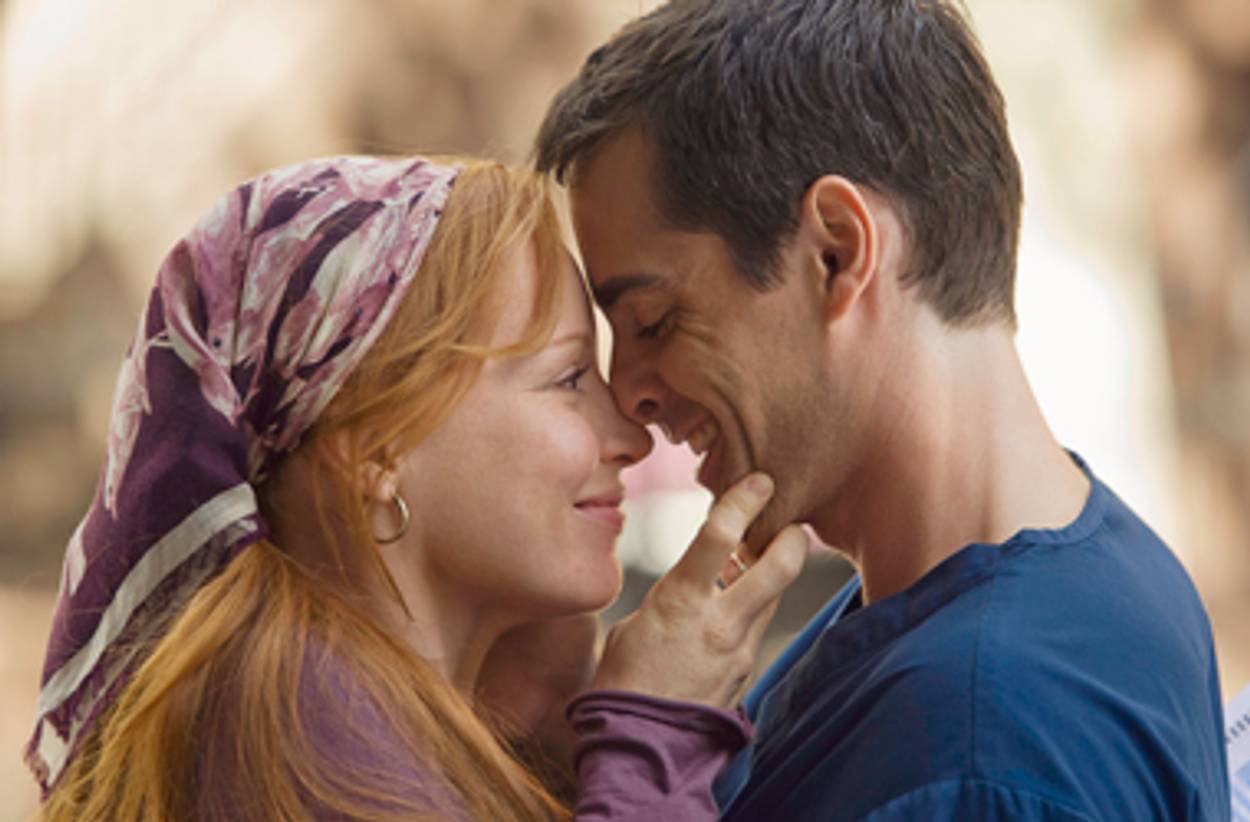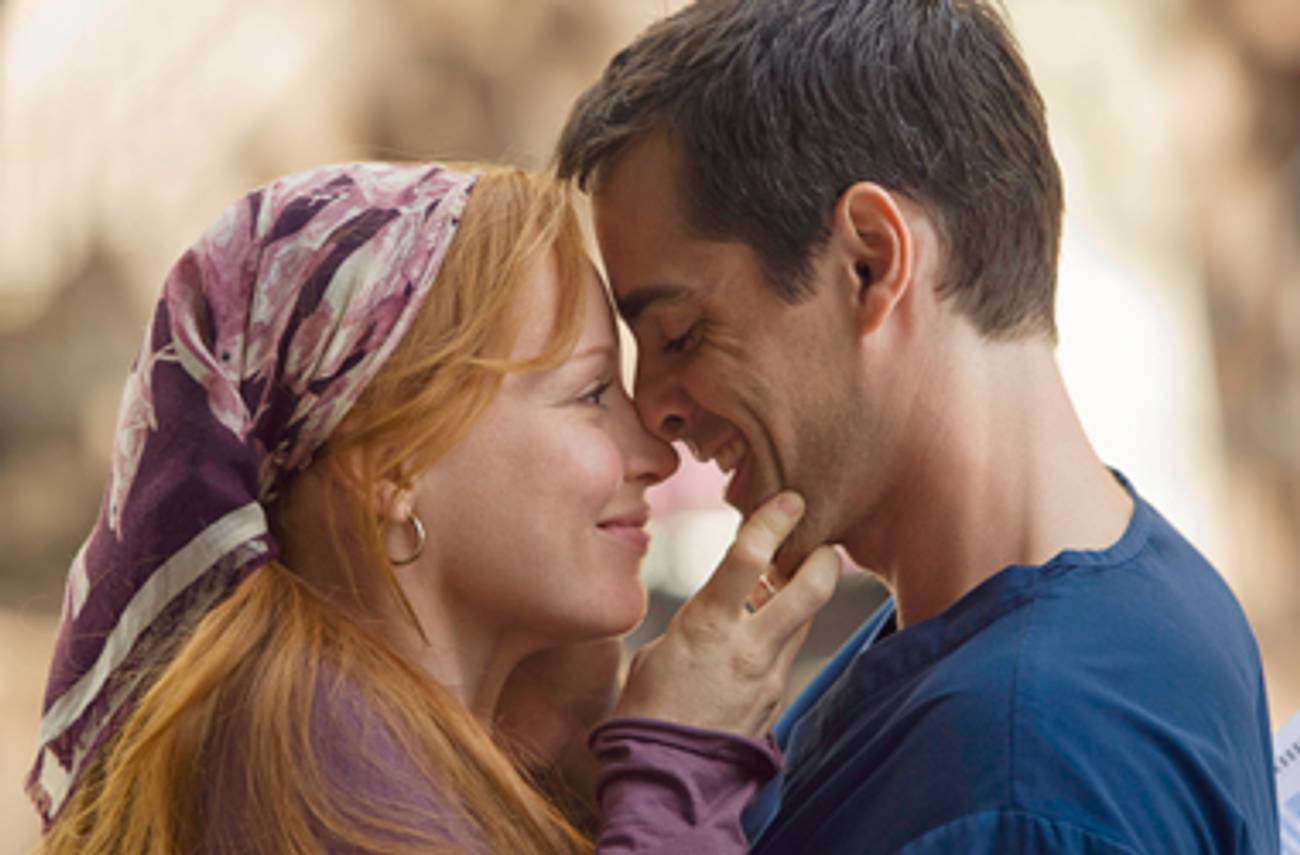Unorthodox Union
CBS’s off-key take on Jewish life and love




Loving Leah, which airs on CBS this Sunday night, is a television movie by people who know a little about Judaism, for people who know a little about Judaism. The story of a young, secular doctor who marries his Orthodox brother’s widow, it features an all-star cast led by Lauren Ambrose and featuring the beloved Mercedes Ruehl, Natasha Lyonne, and Susie Essman, of Curb Your Enthusiasm fame. The presence of Ambrose—a superb actress, whose portrayal of Claire Fisher on HBO’s Six Feet Under is one of the great characters of recent television—will be enough to attract a swath of viewers but, if they’re anything like me, not enough to keep them.
The plot is interesting enough. Dr. Jake Lever, an ambitious young cardiologist played by Adam Kaufman, is living an ambitious young life in Washington, D.C. (“It’s actually Georgetown,” he notes of his neighborhood, bizarrely). He makes a good living, spews macho banter with his Indian-American doctor buddy at the hospital, and regularly gets busy with Carol, an echt-shiksa colleague who is already planning their wedding, with its attendant bridesmaids: “Don’t worry,” she says, not noticing that he looks very worried. “I’m only going to have eight. But it will be in a church, and it will be big.” But he’s actually unfazed by her interfaith idyll, because he has bigger things on his mind. His brother, Benjamin, whom he has not seen in years, has come to him in a dream—black hat, beard and all—to say, profoundly, rabbinically, “You and I are okay.”
That turns out to be a Meaningful Thing, because Jake soon gets the call that Benjamin has died. Jake hurries to Brooklyn for the funeral, after which he is informed by a mini-Sanhedrin of intimidating bearded men that, because Benjamin has left a childless widow (Ambrose), Jake and his sister-in-law must perform the chaliza ritual to void the Levirate law, the obligation that he marry her. Figuring that it can do no harm, and knowing that it’s a big deal to his sister-in-law, Leah, and her people, he agrees. But when the time comes to renounce his ancient obligation to take care of his dead brother’s wife, Jake can’t do it: it feels like an abandonment in death of the brother he wishes he’d never abandoned in life.
And so, with the bearded men watching, Jake pulls Leah out of the room and into the hallway and quickly, in hushed tones, proposes that instead of chaliza they go with option (b), chuppah. “I’ll marry you,” Jake says. “I can’t go back in there and let them finish this ceremony. If I do I’ll be denying my brother’s existence. I did that, for years, and now he’s gone.” Leah, who we already know is a free spirit given to secretly attending movies at revival houses, is already incubating plans to attend college, so she is not about to remarry. But then Jake explains what he has in mind—“We’ll be roommates, separate bedrooms”—and she is flush with a sense of possibility. She can get out of Brooklyn, and Jake can keep a brotherly eye on his brother’s widow.
And then, the inevitable occurs: after living together for a while, they fall in love, their sham marriage slowly turning real—with dignity and humor.
This could have been a good movie—even if it still trafficked in heavy-handed symbolism. After all, Loving Leah still features some emotionally genuine signs of an unlikely couple finding common ground: her hemlines creep up, his knowledge of kashruth deepens. Then there are the very affecting scenes that show Leah, lonely and new to town, trying to figure out what she’s supposed to do with her days in Washington. At first, she cooks Shabbos dinners for two, because that’s what she knows; when Jake, busy at the gym or with Carol, fails to come home, she’s crushed: who is she if she’s alone on Friday nights?
Instead, though, we have a production that is not Jewishly illiterate—it is Jewishly semi-literate, which is somehow worse. Everything about Loving Leah, from its earnest dialogue to its costume design and its visual representations of a religious home, is just knowing enough to rise above obvious kitsch, but not faithful enough to make for real art. While sentimentalizing love is the name of the ratings game, this movie’s real flaw is that it sentimentalizes Judaism, too. For Jake and Leah to make this relationship work, they have to do more than argue themselves past the memory of his dead brother, her dead husband. To forge a believable life together—a life that they can believe in, and that the audience can believe in—they need to figure out what their religion is. And by the end it seems that they have settled on a light-candles-on-Shabbos, keep-a-kosher-home kind of Judaism. They have made a life together, along with a two-hour-long advertisement for Conservative Judaism.
Which would be fine, except that Leah has become friends with the Reform rabbi, played by Ricki Lake, who mispronounces the prayer over the bread, one of the most common in Judaism (“ha motzi leshem” she says, instead of “le-chem.”) One wonders if P’nenah Goldstein’s play, from which she adapted the TV script, avoided these embarrassments Jewish, secular, and cinematic: in the play, are the fake beards on the Orthodox men so obvious? In the play, does the lapsing Jewish widow get schooled in modern love by her pseudo-husband’s sassy black housekeeper? If so, is that housekeeper played by the woman who teaches Mary-Louise Parker how to sell pot on Weeds? And when Leah and Jake finally sleep together, do they wake up in the morning, throw on sweats, cook scrambled eggs, and listen to Michael Bublé?
But OK, one thinks, they’re going to be some sort of pan-denominational Reformodox Jews—but if so, are we to believe the scene in which Leah’s frum mother and sister give their blessing to this new life? (And how is Leah not pregnant yet? Are they using birth control, or is Michael Bublé the birth control?)
It may seem a bit much to expect the filmmakers to capture the nuances of Jewish observance, to know every shin from every sin. But under Jeff Bleckner’s direction, Loving Leah is an American fairy tale, in which religious differences disappear in the solvents of bashert love and American pluralism. It’s a sweet story, one in which no human can truly be a stranger to another. Now, I’m not one to resist a fairy tale, and despite it all I do believe that Jake and Leah could love each other. But in my version their love is more powerful for not being so easy, and more beautiful for not being so simple. In my version their differences matter, their parents don’t understand, and the rabbis—even the Reform ones, even Ricki Lake—say the prayers correctly.
These articles are not currently attributed to anyone. We’re working on it!